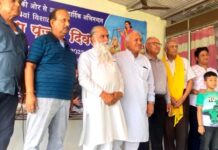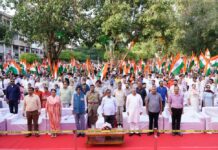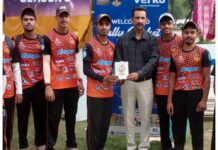A two days National Seminar on the theme ‘Transition from School to Higher Education in the context of National Education Policy 2020’ was organised from September 21-22, 2020 by Centre for Academic Leadership & Education Management (CALEM) Panjab University, Chandigarh under the aegis of PMMMNMTT, MHRD (GOI). About 280 participants from various Universities and Colleges around the country attended the seminar.
On the second day, Professor Pankaj Arora from Central Institute of Education, University of Delhi deliberated on ‘Restructuring School Education’. He discussed on the various aspects covered for school education in fifteen years of schooling. This policy suggests providing vocational education from class VI; play way method a focus at elementary level; instead of IQ based assessment, EQ based assessment has been proposed. He stated that NEP 2020 refers to “No hard Separation” in choice of stream of subjects taken up by the students. School Complexes will help in collaboration and resource pooling among them.
Professor Padma M. Sarangapani from Tata Institute of Social Sciences, Mumbai discussed the recommendations of NEP 2020 for Preparing Teachers for School and Higher Education. She critically overviewed the existing structures in teacher education institutions. She raised some pertinent questions on the good curriculum to support the teacher education programmes; schools do not view the teacher training institutes as partners in teacher training; continuous linkage with the alumni shows the need to prepare them to be faculty in teacher education institutions. She suggested that we can have senior school teachers to act as mentors to the student teachers who go for training to the schools. It is a challenge for the teacher education institutions whether they are preparing student teachers as adaptive experts.
Professor M.A. Sudhir, UGC Emeritus Professor Gandhigram Rural University deliberated on ‘Reflections on NEP 2020 in the context of School Education’. He said the NEP 202 focuses on strategic reforms and innovative reforms. He referred to Mahatma Gandhi’s school of thought on basic and rural education. This policy will help the learners, people and future generations. A major change seen in this policy is by restructuring of school education by including early childhood care and education in the main school set up.He proposed we should now go in for videogogy than to pedagogy. We need to focus on independent thinking and innovative ideas.
In the valedictory session, Professor Raj Kumar, Vice Chancellor Panjab University delivered the valedictory address and he said that NEP 2020 focusses on multiple entry and exit policy wherein giving lot of opportunity to students as per their resources. This policy has given flexibility for choice of courses. It has given lot of scope in terms of knowledge and infrastructure in available competency of all the Universities.
Guest of Honour of valedictory session, Professor Sudhir Gavhane, Vice Chancellor, Mahatma Gandhi Missions University, Aurangabad propounded that the basis of higher education is school education, a pioneering brain shifting where for instance if we make our basement strong, the building of higher education will be very strong. He said education has become digitalized, these technological interventions, school education has improved with COVID-19 situation. NEP 2020 aligns higher education structures to global education structures and promoting Research Intensive Universities.
Chief Guest of valedictory session, Dr. V.K. Saraswat, Padma Bhushan Awardee and Member NITI Aayog, Government of India in his presidential remarks spoke on the topic ‘Higher Education in the Context of National Education Policy’. The foundational skills and numeracy skills was not really good. Their foundation being weak, they could not do much in higher education. GER is starting point for evaluating program in Higher Education. It does not examine ‘Learning Outcomes’. How can our higher education system respond and prepare to skill, reskill and upskill this massive cadre which is being produced in schools? He said the traditional methods followed have not worked well and find a radically different approach to education and learning. The challenges of higher education in India have been enrolment, equity, quality, poor infrastructure, faculty shortages and inability of the state educational system to attract and retain good resource. He emphasized that for good education it is essential to have met knowledge i.e creativity and innovations. He stressed on the Education 4.0. The challenge of today is to move from content to connections, and teachers need training to stay relevant. It is important to instill 4Cs i.e communication, collaboration, critical thinking, and creativity. The NEP 2020 has proposed to follow Industry 4.0 where Government, Industry, University Research all to be aligned.
The Valedictory Session ended with a vote of thanks by Prof. Jatinder Grover, Dean Faculty of Education and Coordinator CALEM, Panjab University, Chandigarh.














